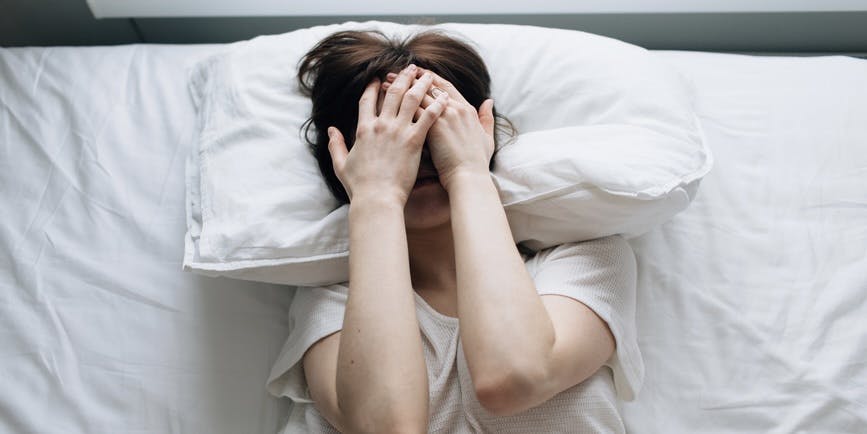
What is bacterial vaginosis (BV)?

Key Points:
- Bacterial vaginosis is caused by an imbalance of good and bad bacteria in the vagina.
- Bacterial vaginosis occurs when something disrupts the chemistry in the vagina like douching or using irritating vaginal products. There’s also an increased risk in those who are sexually active.
- Bacterial vaginosis can cause serious issues if left untreated. This is especially true if you’re pregnant. But you can get BV antibiotics online through a Dr. B health assessment.
If you’ve experienced recurrent bacterial vaginosis (BV), you’re not alone. BV is the most common vaginal condition in people with vaginas between the ages of 15-44. And while it can cause itchy and foul-smelling symptoms, several BV medicines can clear it up.
But you can’t cure BV at home without help.
Read on to learn about what causes bacterial vaginosis. Plus, how to get bacterial vaginosis treatment online through a Dr. B virtual health assessment.
What is bacterial vaginosis?
Bacterial vaginosis is an imbalance of good and bad bacteria in the vagina.
A healthy vagina contains many different types of bacteria. Lactobacillus is the most common type. It’s important to have mostly lactobacilli in the vagina because it protects the vagina from other, more problematic infections.
Lactobacillus can help protect the vagina by:
- Producing lactic acid and other protective antimicrobial byproducts. Lactic acid lowers the pH of the vagina. A low pH is unfriendly for other infectious organisms.
- Competing for nutrients so other harmful bacteria can’t get the fuel they need to reproduce.
- Activating the immune system so it can respond to potential problems more quickly.
- Taking up physical space so problematic bacteria can’t grow and spread.
If there aren’t enough lactobacilli, other types of harmful bacteria can grow unchecked.
The most common bacteria associated with bacterial vaginosis is Gardnerella vaginalis. But others that may trigger it include Atopobium vaginae, Ureaplasma urealyticum and Mycoplasma hominis.
When these bacteria become unbalanced, mild but uncomfortable BV symptoms can follow. Some people don’t have any symptoms. But symptoms include thin discharge, a fishy vaginal odor, itchy vaginal lips or an itchy vulva.
What causes bacterial vaginosis?
BV can be caused by anything that disrupts the natural balance of bacteria in the vagina. This might include douching, using vaginal deodorants or applying irritating products like scented tampons.
Certain activities also increase risk. These include having multiple sexual partners or a new sexual partner. Sex can also lead to BV if your partner’s natural chemistry impacts the flora in your vagina.
Is bacterial vaginosis serious?
Millions of cases of BV happen every year. Fortunately, bacterial vaginosis is not serious on its own. But it can lead to more serious problems. If you experience any BV symptoms—including new or unusual discharge or odor—talk to a medical provider.
Long-term complications of bacterial vaginosis include:
- Increased risk of sexually transmitted infection, including HIV
- Preterm delivery and other birth-related complications
- Pelvic inflammatory disease
- Infertility and miscarriage
- Increased risk of infection after pelvic surgery
Is bacterial vaginosis an STI?
Bacterial vaginosis isn’t a sexually transmitted infection or sexually transmitted disease.
BV can cause vaginal discharge and an unpleasant odor. So people sometimes mistake BV symptoms for chlamydia or a yeast infection. Painful urination means BV can feel like a UTI, too.
While BV is not an STI, it can increase the risk of developing an STI—especially HIV. This can happen because a shortage of Lactobacillus allows other bacteria to take hold more easily.
Researchers aren’t exactly sure how this works. But certain sexual activities can make it more likely to develop BV. These include:
- Having a new sexual partner
- Having more than one sexual partner
- People assigned female at birth (AFAB) who have sex with other AFAB people
Is bacterial vaginosis contagious?
Bacterial vaginosis isn’t contagious and BV doesn’t spread from one person to another. But sexual activity increases the risk of developing BV. This is because of the way sex can impact your vaginal microbiome.
There’s no definite way to avoid a BV infection entirely. But some lifestyle changes can help prevent BV.
Online treatment for bacterial vaginosis
Bacterial vaginosis is treated with a short course of antibiotics.
There are no over-the-counter medications available for BV. Some over-the-counter products used for yeast infection can actually make BV worse. If you think you might have BV, talk to a medical provider. They’ll make sure you get the right BV treatment.
Dr. B can help! Complete a virtual health assessment. We’ll connect you with a licensed provider. They’ll talk you through how to treat bacterial vaginosis and the best BV prescription options available. If they find a bacterial vaginosis prescription is appropriate, they’ll call it into your local pharmacy.
Sources:
Abou Chacra, L., et al. (2022). Bacterial vaginosis: what do we currently know?. Frontiers in Cellular and Infection Microbiology.
Centers for Disease Control and Prevention. (2022). Bacterial vaginosis - CDC basic fact sheet.
Goje, O. (2021). Bacterial vaginosis (BV) - gynecology and obstetrics. Merck Manuals Professional Edition.
Planned Parenthood. What is bacterial vaginosis? Symptoms, signs and causes.
Ravel, J., et al. (2021). Bacterial vaginosis and its association with infertility, endometritis, and pelvic inflammatory disease. American Journal of Obstetrics and Gynecology.
Valenti, P., et al. (2018). Role of Lactobacilli and Lactoferrin in the mucosal cervicovaginal defense. Frontiers in immunology.
Sign up for the free Dr. B newsletter for a weekly report on the latest in healthcare + research-based advice for staying healthy and mentally well.
Related articles







